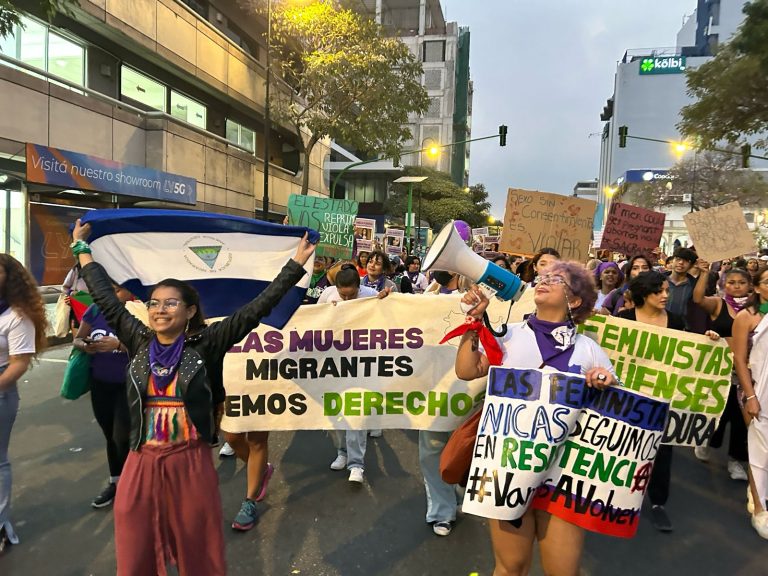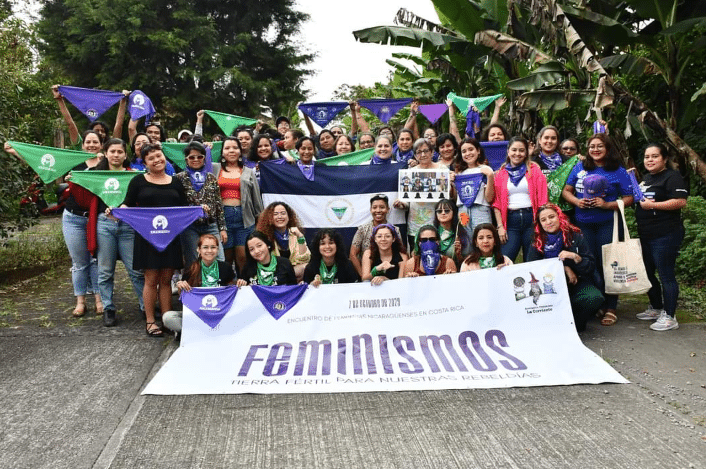11 de marzo 2024

“NicaraguAmor” Cultural Caravan for Nicaraguans in the USA

PUBLICIDAD 1M
PUBLICIDAD 4D
PUBLICIDAD 5D
For the sixth consecutive year, exiled Nicaraguan feminists united with Costa Rican women in a march, held in San Jose on March 8

Migrant, exiled, and banished Nicaraguan women took to the streets of San Jose, Costa Rica on March 8th, to commemorate International Women’s Day. Photo: Katherine Estrada / Confidencial
Exiled and migrant women, plus those banished by the regime of Daniel Ortega and Rosario Murillo, united in a march of “resistance” and “solidarity,” held in Costa Rica on March 8th, in commemoration of International Women’s Day.
The demonstrators, a key component of San Jose’s national march, issued an urgent call to the democratic governments of Latin America and the world to adopt conclusive measures to stop the Nicaraguan government repression.
Beginning at 4 pm, a diverse group of Nicaraguan women gathered at San Jose’s Central Park in response to a call from the group Nicaraguan Feminists Exiled in Costa Rica. The group is made up of women’s collectives and organizations, plus independent feminists residing in the country. This is the sixth year they’ve marched in Costa Rica, since all non-government demonstrations have been prohibited in Nicaragua since 2018, when a de facto police state was imposed there.
“We demand justice, and we persist in the struggle for our rights in the face of the escalation of state violence we’ve faced in Nicaragua since 2007, violence that intensified during the crisis of 2018. Marching in this country [Costa Rica] is an act of resistance,” declared Diana Herrera of the La Corriente Feminist Association, one of more than 200 women’s organizations shuttered by the Nicaraguan dictatorship and reestablished in Costa Rica in 2023.
The organizing commission for the March 8 march in Costa Rica opted to place the Nicaraguan bloc at the head of the demonstration, right after the initial banner that opened the march, which began at 5 pm.
The Nicaraguan feminists held signs with the faces of the 19 female political and student activists, feminists, and human rights advocates that are still being held as political prisoners in Nicaragua.
“It’s impossible for the Ortega-Murillo government to speak about women’s rights in a country where they don’t guarantee minimum conditions to live with dignity and access to justice. Marching here signifies resistance, and our determination to continue fighting for our rights and for the women who are still in Nicaragua, with no access to a decent life,” commented “Cosette,” an independent feminist who lives in Costa Rica. She asked to remain anonymous out of fear for the safety of her family still in Nicaragua.
The La Corriente Feminist Association also created a music video to commemorate International Women’s Day, in collaboration with Guatemalan feminist singer-songwriter Rebeca Lane. The song, entitled “Vamos a Volver” [“We will return”], could be heard throughout the march.
The demonstration ended in front of Costa Rica’s National Assembly building where the Nicaraguan Feminists Exiled in Costa Rica group took a moment to read their official statement.
In October 2023, the group Nicaraguan Feminists Exiled in Costa Rica was organized, with the participation of over 65 women.
“During the past five years, we’ve actively committed ourselves to processes of social transformation, strengthening our networks of solidarity among the Nicaraguan feminists in exile, maintaining firmly the fundamental feminist principle that the struggle is collective,” Herrera stated.

To these women, this space is critical. Aware of the violence that women in Nicaragua, as well as migrant women in Costa Rica face, it allows them to organize to promote changes.
The group has held camps, forums, recitals, and other events to make visible the reality of Nicaraguan women, within as well as outside of Nicaragua. They hope to continue strengthening the networks and alliances, offering opportunities to become fully educated about their rights.
Despite the many attempts of the Ortega-Murillo regime to disarticulate the feminist organizations and make them disappear, they continue working from outside the country on behalf of those who are within Nicaragua. They continue denouncing the violent acts in Nicaragua and demanding justice for all women, including the political prisoners, the victims of femicide and sexual abuse, and those suffering generalized violence in exile.
This article was published in Spanish in Confidencial and translated by Havana Times. To get the most relevant news from our English coverage delivered straight to your inbox, subscribe to The Dispatch.
PUBLICIDAD 3M
Periodista nicaragüense exiliada en Costa Rica. Se ha especializado en la cobertura de temas de migración, género y salud sexual y reproductiva. También ha trabajado en Marketing y Ventas y ha sido Ejecutiva de Cuentas.
PUBLICIDAD 3D